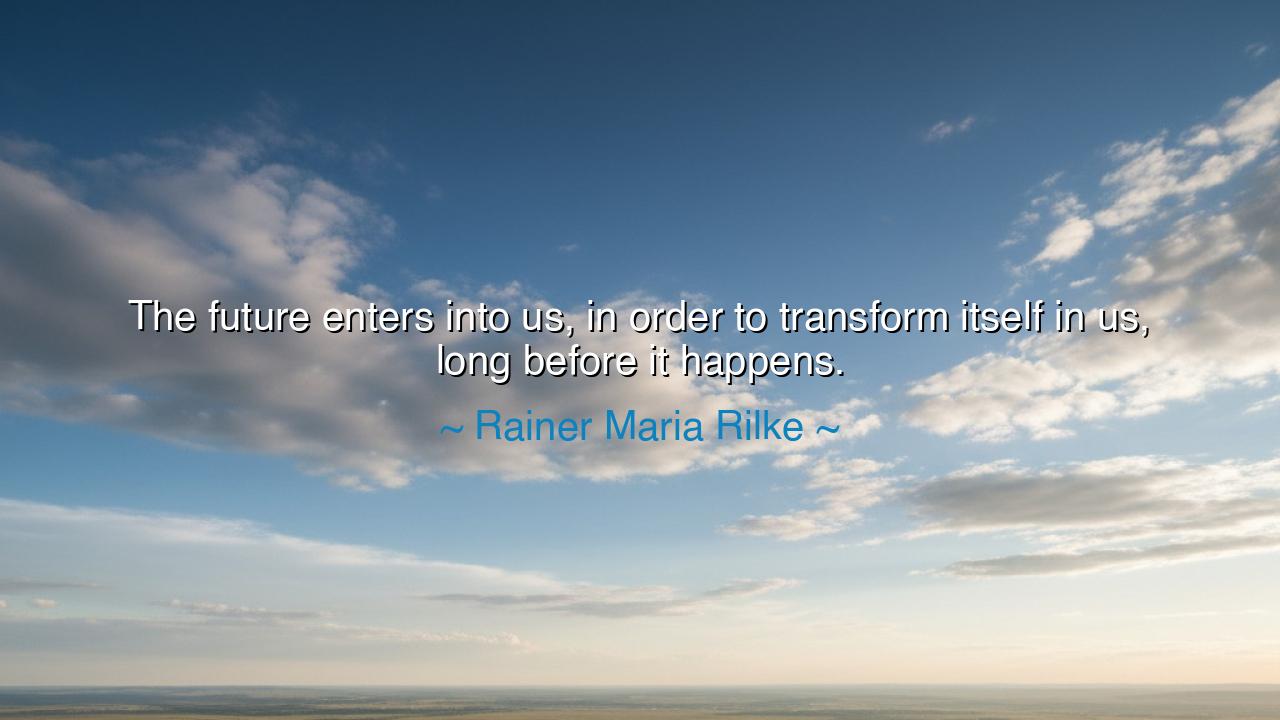
The future enters into us, in order to transform itself in us






In the unfolding tapestry of life, there are moments when we feel the weight of time—when the present seems too fleeting, and the future remains an ever-elusive horizon. Yet, the profound insight of Rainer Maria Rilke in his words, “The future enters into us, in order to transform itself in us, long before it happens,” touches upon a hidden truth: the future is not something that waits passively to happen to us; it is already woven into our very being, shaping us before we even realize it. The future is not just a distant event; it is a force that moves through our lives, changing and molding us in ways that are often imperceptible, until one day, we look back and realize that who we are today was guided by what was to come.
In the ancient teachings, there was always a recognition of the power of destiny and the foreknowledge of events to come. The Oracle of Delphi, for example, was said to possess the ability to glimpse the future and to speak of it in riddles. Yet, even in those ancient prophecies, there was an understanding that the future does not simply appear in our lives as a set of predetermined events; it enters us, shapes us, and calls us to rise to meet it. The prophecies of old were never static—they were active forces that moved through the people who received them, transforming them long before the events themselves unfolded. In this way, the future was seen not as something out there, but as something already deeply embedded in the soul of those who walked the path ahead.
Consider the example of Julius Caesar, whose rise to power was marked not only by military genius but by an uncanny understanding of his own destiny. From a young age, Caesar was aware that the future was calling him to something greater, and he worked tirelessly, not just to prepare for it, but to shape it. Even in his early military campaigns, he seemed to know, instinctively, how to navigate the tides of history, as if the future had already begun to transform him. His ambition was not simply a reaction to the world around him; it was a transformation within him, a sense that he was becoming the person he was destined to be long before his rise to the throne. Caesar’s life shows us how the future, once it enters us, shapes our decisions and our actions long before we ever fully grasp its significance.
Rilke’s words also remind us of the deep connection between time and self-growth. We often think of the future as a series of events that will unfold in their own time, but what if the future is already quietly influencing the way we think, feel, and act? Take the example of Thomas Edison, whose relentless pursuit of invention and discovery was not driven solely by the present moment, but by a vision of a world transformed by electricity. Edison did not merely respond to the world around him; he felt the pull of the future, which entered into his consciousness, shaping his work ethic, his creativity, and his deep belief that the world would one day be illuminated in ways no one yet imagined. The future had entered him long before it ever arrived, and in doing so, it transformed him into the man who would light the world.
What Rilke is saying is that we must begin to acknowledge the subtle influence of the future that already moves through us. In the same way that a seed carries the potential of a mighty tree before it even sprouts, the future holds the seeds of who we are becoming. When we encounter struggles, doubts, or setbacks, we must remember that they are not just products of the present moment; they are the forces of transformation that have been planted within us, pushing us toward growth and change. Much like the sculptor chiseling away at the marble to reveal the figure within, the challenges we face are the tools that the future uses to reshape us, long before we even realize what we are becoming.
The lesson of Rilke’s insight is one of patience and faith in the process of becoming. The future is not something to be feared or resisted, but something to be embraced. It enters us quietly, transforming us slowly and steadily, like the seasons that change the landscape without our noticing until, one day, we wake to see the world completely different. Trusting the journey is vital, for even in the moments of uncertainty or difficulty, the future is already working its magic within us. We are becoming who we are meant to be, even when we don’t yet understand the full shape of it.
So, in our own lives, we must learn to listen to the whispers of the future, the ideas, the visions, and the dreams that rise within us. We must not seek only to fix the present or focus solely on the trials at hand, but we must allow ourselves to be shaped by the future that is calling us. Let us walk forward in faith, trusting that the transformation is already in progress, that who we are becoming is part of a larger design. As Rilke so poignantly teaches us, the future is not a distant event—it is already here, moving through us, transforming us long before it happens. And in this, we find the courage to face the unknown, knowing that the future is shaping us into who we are meant to be.






AAdministratorAdministrator
Welcome, honored guests. Please leave a comment, we will respond soon